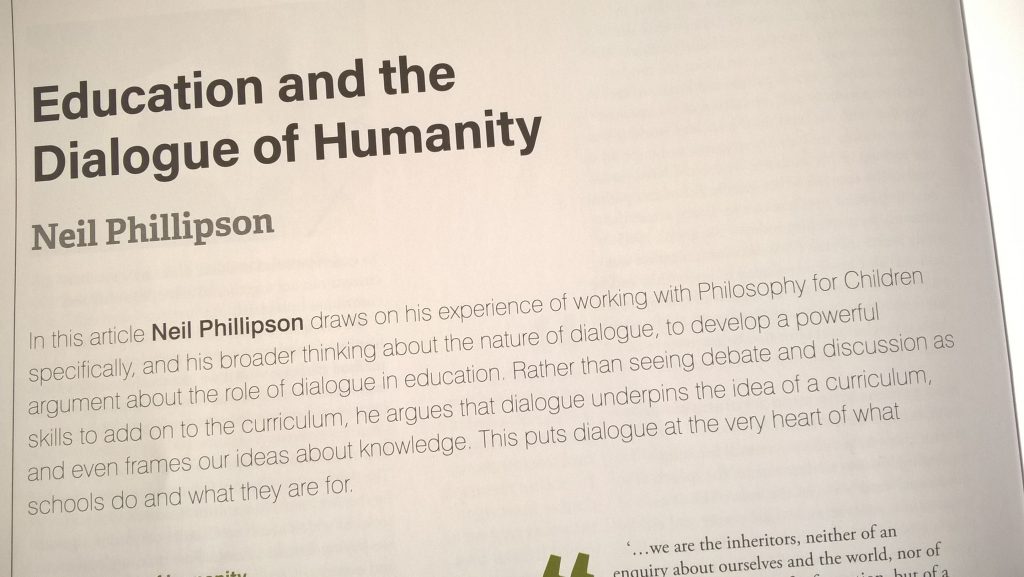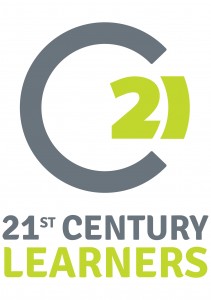Education and the Dialogue of Humanity

What follows is the text of my article for the Summer 2018 issue of Teaching Citizenship.
The dialogue of humanity
I spend a lot of time arguing that teaching young people how to engage in dialogue is profoundly important. I go as far as to argue that one of the purposes of education is to draw young people into dialogue. This can draw fire from those persuaded that education is all about giving young people knowledge, but I think this is due to a misunderstanding of the argument; I think dialogue is essential to the meaningful development of knowledge. I also think it’s essential to becoming a better citizen and a better human being.
Let’s start to substantiate these claims by considering the idea that education is a process of drawing into dialogue. Many people follow Matthew Arnold (1875) in arguing that our young people have a right to come to know ‘the best that has been thought and said’. I agree. But I think it’s important to acknowledge that the ‘best that has been thought and said’ is not the final word, but rather a collection of enduring contributions to an ongoing dialogue. Michael Oakeshott (1959) expresses this idea in his description of the ‘conversation of mankind’ (perhaps better described for modern times as the ‘dialogue of humanity’):
‘…we are the inheritors, neither of an enquiry about ourselves and the world, nor of an accumulating body of information, but of a conversation, begun in the primeval forests and extended and made more articulate in the course of centuries. It is a conversation which goes on both in public and within each of ourselves.’
Oakeshott also tells us that ‘In conversation, ‘facts’ appear only to be resolved once more into the possibilities from which they were made; ‘certainties’ are shown to be combustible…’, again emphasising the idea that knowledge is not fixed and final. In our recent book about Dialogic Education, Professor Rupert Wegerif writes that the education of young people is about ‘…enabling them to participate in the long-term cultural dialogues that make up the dialogue of humanity. On the one hand children’s lives are enriched by this participation and on the other hand the dialogue of humanity is enriched, refreshed and taken forwards by each generation of new recruits’ (Phillipson & Wegerif, 2017).
In this view knowledge is provisional and perspectival; it is not ‘dead’, but living, growing, evolving. It follows that while ‘the best that has been thought and said’ is valuable, it should be taught in a way that keeps it open to revision and reveals its relevance to the modern world and to our lives. This is important because it keeps our minds open to other possibilities and allows us to aspire to make a useful contribution to the dialogue of humanity in our own lifetimes.
But what of the claim that dialogue is essential to the meaningful acquisition of knowledge? The long term cultural dialogues that Wegerif refers to above might include disciplines such as science, mathematics and theology. Concepts such as force, proof and love are much less precisely specified in everyday life than they are in these disciplines; coming to see such ideas from the perspective of an academic discipline or school subject requires a ‘creative leap‘ and this kind of perspective taking is precisely what is learned when learning to dialogue.
We make sense of all new ideas or concepts by relating them to our existing understandings of the world (our schemas) which are formed from our previous experiences. Since people have different experiences it seems inevitable that they will come to understand new ideas in different ways; this makes it very difficult to simply ‘transmit’ ideas from one person to another, from A to B. Instead A and B need to seek to understand each other’s perspective, to allow the different perspectives to challenge each other and ultimately create new perspectives or schemas; in short A and B (whether they be student and teacher or peers) need to engage in dialogue.
This is not to say that there is no place in education for the ‘transmission’ of information. We might acknowledge that number facts, the conjugation of verbs in different languages and key historical dates, for example, are best learned by rote. And an introduction to Newton’s laws may well require careful exposition – students really can’t discover everything for themselves. But ultimately if we want students to make meaning of propositional knowledge and to come to understand it from the perspective of the teacher or of the subject, then we need to give them the opportunity to engage in dialogue.
Dialogic Pedagogy
If we accept the view of knowledge and its acquisition set out above there are clearly implications for our thinking about pedagogy. A dialogic pedagogy will, of course, involve creating opportunities for teaching through dialogue. However, good dialogue is not as easy to achieve as we might like, and so dialogic pedagogies must also be concerned with teaching young people how to engage in dialogue (teaching for dialogue). There are a number of well-established pedagogical approaches that support teaching both through and for dialogue: Dialogic Teaching (Robin Alexander), Thinking Together (Neil Mercer, Lyn Dawes and Rupert Wegerif) and Accountable Talk (Lauren Resnick) are notable examples.
The approach I use most often is the development of ‘Communities of Enquiry (CoE)’. The idea of the CoE was employed by Matthew Lipman in his development of Philosophy for Children, something I have been involved in for a number of years (for more information visit: https://www.sapere.org.uk). Members of a CoE engage in a collaborative effort to reach better shared understandings of different perspectives and different ideas and concepts. These concepts can be those central to living a good or considered life (fairness, forgiveness or beauty, for example) or those that are central to disciplinary knowledge (proof, energy or significance, for example). Participants reflect on their developing (ever provisional) understanding of ideas and on the developing quality of their dialogue.
The ‘4Cs’ framework supports groups to begin to articulate what good dialogue involves and to work progressively towards it. This framework is based on Matthew Lipman’s contention that good thinking (and good thinking together, or dialogue) involves different (yet inter-related) modes of thought: caring, collaborative, critical and creative. These modes of thought can be defined to some extent through the development of related ‘ground rules’ as illustrated below.

Such ground rules are certainly not comprehensive and will need to be reviewed and developed over time, but they might provide a useful starting point in the journey towards ‘good dialogue’. It is perhaps the capacity of a CoE to reflect on such rules and their impact and sustain the effort to realise good dialogue that will ultimately determine the success of this dialogic approach.
All of the approaches mentioned have been demonstrated to impact positively on student attainment. In the last two years studies carried out by the Education Endowment Foundation in England have suggested that Philosophy for Children (Gorard et al., 2015) and Dialogic Teaching (Jay et al., 2017) raise attainment in a number of subjects (larger follow-up studies are underway). I would argue that the use of one or more of these approaches is invaluable in the development of dialogic pedagogy.
Teaching for dialogue is effortful and requires time. Fortunately the benefits go well beyond the meaningful acquisition of knowledge. Dialogic skills are essential to problem-solving. This is contested by some. Daniel Willingham (2007) reminds us of the importance of subject knowledge to problem-solving:
‘The processes of thinking are intertwined with the content of thought (that is, domain knowledge). Thus, if you remind a student to ‘look at an issue from multiple perspectives’ often enough, he will learn that he ought to do so, but if he doesn’t know much about an issue, he can’t think about it from multiple perspectives.’
I agree with Willingham. But I don’t think the premise ‘dialogic thinking skills are of little use without a depth of subject knowledge’ leads to the conclusion ‘a depth of subject knowledge is sufficient’. I think there is a synergistic relationship here: knowledge is important for problem-solving, but it is complemented by the ability to ‘think well’. And as Wegerif (2016) explains:
‘…to think usefully in any domain you need content knowledge but the fundamental process of the thinking is universal… in the very human sense of ways of orientations towards others or ways of relating to others in a dialogue. Being able to switch point of view is essential to all forms of good thinking… in every domain. And being able to switch point of view is not something that everyone does equally well and is something that can be taught.’
And of course problem solving goes well beyond academic learning. Participating in society means solving problems and overcoming challenges together: reasoning and being reasonable. Preparing young people to participate in the kind of ‘deliberative’ democracy envisaged by philosophers such as Dewey, Habermas, and Rawls means teaching them how to engage in careful, collaborative, critical and creative dialogue. This seems to be recognised in the English National Curriculum: the programmes of study for Citizenship make clear the perceived importance of young people being able to share their opinions and seek to understand the perspectives and values of others, including those from other places and other times.
And, perhaps most importantly of all, there is a moral obligation to teach dialogue. The philosopher Dmitri Nikulin (2010) tells us that ‘Dialogue is a therapy – perhaps the therapy – against the misrecognition of one person by another’. In a world in which so much suffering is caused by the failure of one person to recognise the humanity of another, I would argue that not teaching dialogue is an abdication of our moral responsibility as educators.
A dialogic education will help young people to gain and make sense of knowledge, to appreciate its significance and relevance and to believe that they might have a role to play in its continued development. It will also enhance them as human beings, making them concerned and able to come to understand different perspectives and enabling them to engage in critical, caring, collaborative and creative dialogue with ‘the other’ in whatever form they encounter it.
Acknowledgements: The ideas expressed in this article have been shaped by dialogues with my colleagues Rupert Wegerif (Professor of Education at Cambridge University) and Diane Swift (Director of Keele and North Staffordshire Teacher Education).
References
Arnold, M. (1875). Culture and Anarchy. Available at https://bit.ly/2pYOo3u
Gorard, S., Siddiqui, N. and See, B. H. (2015). Philosophy for Children: Evaluation Report and Executive Summary, EEF. Available at https://bit.ly/2GJ7Uvd
Jay, T., Willis, B., Thomas, P., Taylor, R., Moore, N., Burnett, C., Merchant, G., Stevens, A. (2017). Dialogic Teaching: Evaluation Report and Executive Summary, EEF. Available at https://bit.ly/2h45RGM
Nikulin, D. (2010). Dialectic and Dialogue. Stanford: Stanford University Press.
Oakeshott, M. (1959). The Voice of Poetry in the Conversation of Mankind. London: Bowes and Bowes.
Phillipson, N. and Wegerif, R. (2017). Dialogic Education: Mastering Core Concepts through Thinking Together. London: Taylor and Francis.
Wegerif, R. (2016). Comment made on a blog. Available athttps://bit.ly/2H2QpUg
Willingham, D. T. (2007). Critical Thinking: Why Is It So Hard to Teach? American Federation of Teachers. Available at https://bit.ly/1GqwqLL



January 3rd, 2021 at 23:02
[…] Neil Phillipson offers a thoughtful overview of the importance of dialogic pedagogy in helping learners “to gain and make sense of knowledge, to appreciate its significance and relevance and to believe that they might have a role to play in its continued development. It will also enhance them as human beings, making them concerned and able to come to understand different perspectives and enabling them to engage in critical, caring, collaborative and creative dialogue with ‘the other’ in whatever form they encounter it.” Available at: http://21stcenturylearners.org.uk/?p=1105 […]